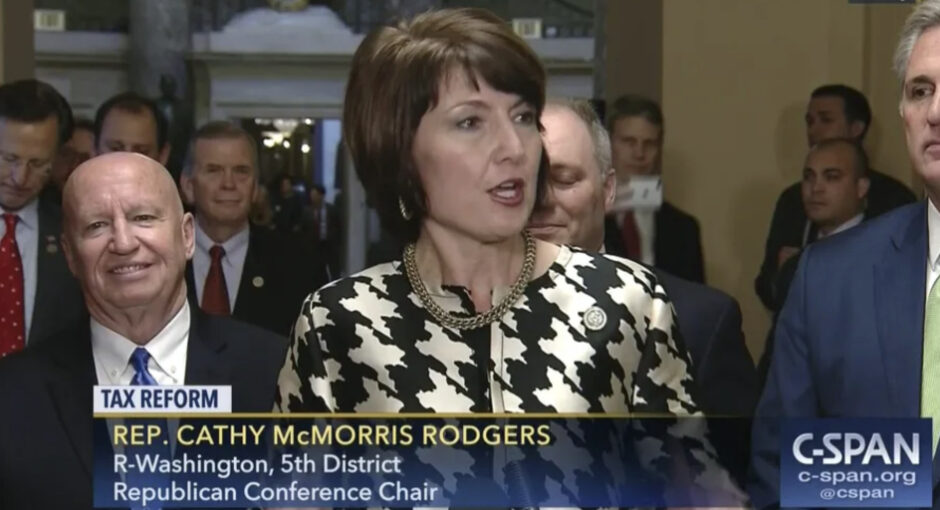Top U.S. House Republicans sent U.S. Health and Human Services Secretary Xavier Becerra a letter on Monday asking 18 detailed questions about implementation and oversight of the Inflation Reduction Act’s (IRA) Medicare drug price negotiation provisions. Their interrogation foreshadows intensified oversight and potential challenges to the law that Republicans plan to pursue if they win back control of the House in November.
House Democrats came back from their summer recess on Aug. 12 to pass the IRA on a party-line vote of 220-207. The bill not only includes a host of measures intended to lower drug prices but also addresses climate change and increases funding to the U.S. Internal Revenue Service to go after tax cheats.
The letter, penned by ranking Republicans Cathy McMorris Rodgers (Wash.) and Kevin Brady (Texas) of respective House Energy & Commerce and Ways & Means committees, also requests monthly briefings by HHS to committee staff beginning in mid-September “to update us of your plans and progress in implementing the law” permitting Medicare to negotiate prices for a handful of drugs beginning in 2026. Becerra was given a deadline of Sept. 12 to respond.
The GOP lawmakers do not ask any specific questions related to the 340B drug discount program, but they raise concerns about using federal guidance rather regulations to implement federal law. Pharmaceutical manufacturers and some GOP lawmakers have criticized the 340B program since many aspects of the program, including the contract pharmacy program, are governed by guidance rather than the more formal rulemaking process spelled out in regulations.
Among the many items addressed in the correspondence, McMorris Rodgers and Brady ask if Becerra and his staff have any previous experience “setting prices for pharmaceutical products,” and whether the U.S. Centers for Medicare & Medicaid Services (CMS) intends to use rulemaking versus guidance to fine tune the negotiation process—the leaders prefer the former, which requires a public comment period. The negotiation provisions allow CMS to use guidance to implement some aspects of the law.
The Republican leaders ask HHS to commit to setting a price floor for negotiated medications to supplement the price ceiling to be achieved through negotiation, as well as to “keeping [Center for Medicare and Medicaid Innovation] CMMI resources out of this new program.” They ask for a detailed timeline and plan for the use and oversight of the $3 billion earmarked for implementation of negotiation, as well as whether HHS intends to use outside contractors to conduct pricing analysis, and “if so, what controls will be in place to ensure funding is not excessive or improperly used by contractors?”
In addition, McMorris Rodgers and Brady ask how HHS will “plan for and respond to drug shortages if the price setting process leads to less access to necessary drugs, as we have seen in other markets where governments set the prices for a large percent of the market.”
A news release from Republicans on the Ways & Means Committee lauds McMorris Rodgers and Brady for “urging Secretary Becerra to be completely transparent and forthright” on the execution and impact of what they call the “cure-killing price control scheme” of Medicare drug price negotiation.
The IRA, signed into law on Aug. 16, contains provisions allowing Medicare to negotiate drug prices for 10 Part D drugs beginning in 2026 and adding another 15 Part D drugs the following year. In 2028 and 2029, Part B drugs are added to the mix, with Medicare permitted to negotiate another 15 Part B and Part D drugs in 2028, and another 20 Part B and Part D drugs in 2029 and subsequent years.
In order to be eligible for negotiation under the new law, regular small-molecule drugs must have been on the market for at least nine years, or 13 years for biologics such as insulin. An analysis by the non-partisan Congressional Budget Office (CBO) has estimated a modest effect on drug development, with 15 of 1,300 drugs not coming to market over the next 30 years, or about 1% of new drugs.
Medicare drug price negotiation has been championed by Democrats and fiercely opposed by the drug industry since the early 1990s when President Clinton tried to enact legislation allowing the government to negotiate drug prices. When Republican lawmakers narrowly passed the 2003 law creating the Part D program, GOP leaders were successful in adding a “non-interference clause” prohibiting government price negotiation. The IRA repeals the non-interference clause. However, the negotiation provisions represent a significantly scaled-back version of those contained in previous iterations of drug price legislation introduced in both the House and Senate in recent years, such as H.R. 3, introduced by House Speaker Nancy Pelosi (Calif.) last session.
Still, passage of the more limited drug price negotiation provisions in the IRA is considered a major political victory for Democrats and they plan to campaign on its passage this fall. Prior to Senate passage, the CBO estimated that the IRA’s drug pricing provisions in entirety would generate close to $300 billion in savings over ten years. That total figure is likely to be reduced modestly since a provision that would have applied inflationary penalties to the private market was ruled out of bounds by the Senate parliamentarian.


